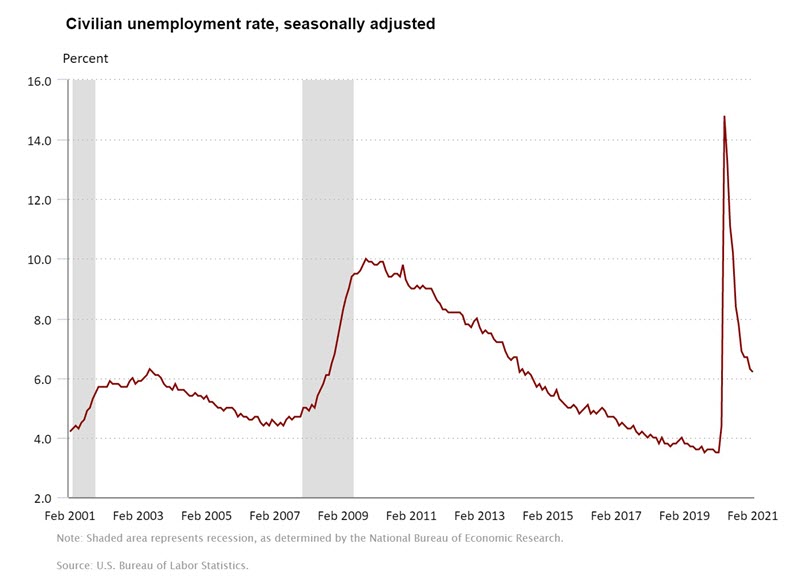New Normal: High Unemployment, Near-Zero Interest Rates and Out of Control Inflation
 Bullion.Directory precious metals analysis 12 March, 2021
Bullion.Directory precious metals analysis 12 March, 2021
By Peter Reagan
Financial Market Strategist at Birch Gold Group
Much of the mainstream discussion argues that returning to the “old” normal isn’t likely to happen. Things like pre-pandemic employment, closer-to-normal price inflation, and less economic uncertainty just aren’t on the map.
The Street summed it up generously as: “Numerous chain reaction ripple impacts will delay the economic recovery.” Some of these “ripple effects” were in motion long before the pandemic hit.
For example, the Fed was already in a state of panic thanks to an out-of-control repo rate fiasco from 2019, mounting debt, and potential ineffectiveness of its main tools.
During the “old normal” the Fed would have been able to deploy its tools to control rates and keep unemployment under control — but that might not be possible now or in the future.
Under the post-pandemic “new normal,” the potential exists for the “ripple effects” from the state closure of small businesses, developing automation, and fractures in the food supply chain to be felt more permanently.
Is the U.S. Heading for Permanently High Unemployment?
In a way, thanks to the pandemic, yes it is. But it depends on many factors.
Wolf Richter laid out why he thinks the sudden economic shifts that happened in 2020 will take years to sort out:
Now the Pandemic has forced businesses to change. There is no going back to the old normal. And these technologies impact employment in both directions.
If the pandemic has forced businesses to adopt technologies that automate certain functions, then the employees that performed those functions will no longer be necessary.
Wolf used a ski resort as one example. E-commerce technology the resort was previously slow to adopt ended up replacing employees that used to tend to long lines of customers. If the resort hadn’t utilized the e-commerce tech, then it wouldn’t have been able to maintain the Government-imposed social distancing requirements.
You can see the current unemployment trend reflected in the official chart below. Keep in mind that as more businesses adopt automation technologies to stay afloat, the unemployment rate of 6% isn’t likely to get much lower, and could start rising again:

Another example of the “new normal” comes from Naomi Prins: “People who have been telecommuting can live outside of more expensive urban areas, or just more expensive areas in general. The residential real estate frenzy of getting out of their urban areas will continue because I think more people will continue telecommuting.”
This migration out of urban centers will hit commercial real estate hard. There will be fewer jobs in commercial leasing, property management, construction, and sales.
One in three Americans is already on unemployment and struggling to pay for food, rent, and other basics. Job losses in any sector will only make the problem worse.
So will these new higher unemployment numbers trend that way permanently? It’s too soon to tell. With new technologies usually comes new types of jobs. After all, people still have to fly drones, educate others on new digital tech, and fix 3-D printers.
But remember the WEF called for a permanent 13% reduction in the workforce (what are those poor unfortunates supposed to do?). Who knows if new tech will actually create new jobs, how well they’ll pay, or whether they’d even be based in the U.S.?
On top of the “new normal” for employment comes inflation that could last for quite awhile.
Rising Inflation Dead Ahead (With Even More to Come)
We’ve warned about the potential for a dramatic rise in price inflation for a few months now, and CNBC reveals that time could be arriving fast:
Moody’s Analytics Mark Zandi believes Wall Street is significantly underestimating the seriousness of an inflation comeback, and he warns it will affect every corner of the market — from big tech to cyclical trades… Inflationary pressures will develop very quickly.
Zandi warned CNBC’s Trading Nation that he sees inflation “dead ahead.” He also proclaimed that “not even stocks tied to the economic recovery will offer investors a safe haven.”
Looks like inflation pressures are building up fast. Food inflation remains high at 3.6%. Energy price inflation has also jumped out of the gutter, increasing to 2.4%.
Overall inflation is no longer “flat” as it has been since August 2020. The official tally rose to 1.7% in February.
But the Inflation Carnage Doesn’t Seem Like It Will End There…
Both rent and gas prices are expected to skyrocket by almost 3 percent more over expectations just one month ago. Plus, the “short-term inflation expectation edged up to 3.1 percent, its highest level since July 2014.”
And then there’s the “real” inflation rate. It’s figured using methodology from the 1990s, just before the Fed stopped including a realistic standard of living in its calculation. All told, that price inflation currently clocks in at almost 6 percent.
Compare that to the average interest rates on traditionally conservative, “safe” places for your savings… You’re lucky to get a 0.5% APY on cash in a savings account (should you be grateful for losing 5.5% of your buying power per year?). Or you could buy U.S. 10-year Treasury bonds – at 1.5% APY you’re only losing 4.5% annually. We’ve said it before and we’ll say it again: low interest rates are essentially a tax on your savings.
What’s worse? Jerome Powell’s Federal Reserve has made no secret of their willingness to keep rates low for as long as it takes to lower the unemployment rate…
Is that even possible in the new normal, with jobs disappearing forever?
We’ve already mentioned the havoc low interest rates play on savers, but let’s not forget the other consequences of near-zero interest rates:
- Encouraging risky speculation in the stock market
- Inflating asset prices, also known as the “Everything Bubble“
- Wreaking havoc on pension funds (maybe that’s why the needed a bailout)
- Laying the foundations for wealth-destructive hyperinflation
- Eventually, inevitably, dethroning the U.S. dollar as the reserve currency of choice
The Fed’s driving the bus. There doesn’t seem to be a map, but Chairman Powell is behind the wheel and he assures us the new normal is just something we’re driving through on the way to our destination: a wonderful, magical place where everyone will have income (with or without a job) and a Social Security check waiting for them at retirement time, where inflation doesn’t eat away at savings, where unicorns dance with leprechauns every morning and the stock market goes up forever. Sounds beautiful, doesn’t it?
There’s only one problem: we’re all stuck on this bus, we can’t get off – and the bus runs on cash, lots and lots of cash printed by the Fed specifically to get the bus all the way to its magical destination… But don’t worry, right? Just trust the driver, because there’s no map and you’re just a passenger, you have zero control, might as well enjoy the ride. Right?
Or maybe you should buckle your seat belt and make sure you know where the exits are, because the trip might get strange really fast.
Are You Just A Passenger?
With Chairman Powell driving the bus toward unknown territory at what seems to be reckless speed, it’s time for you to consider ways to secure your savings.
Don’t let market volatility, inflation, and shifts in the business landscape put your retirement savings in danger. Consider “packing” your retirement savings the same way you’d pack a bag for an unknown destination. You’d want the widest possible diversification across cold and warm-weather clothing, formal and casual attire, assets that thrive in good times as well as assets that protect in bad times.
Physical gold and silver can help diversify your savings and even act as a safe haven for your wealth as the dollar’s buying power gets relentlessly consumed to keep driving our poor lost bus down the road.
Peter Reagan

Peter Reagan is a financial market strategist at Birch Gold Group, one of America’s leading precious metals dealers, specializing in providing gold IRAs and retirement-focused precious metals portfolios.
Peter’s in-depth analysis and commentary is published across major investment portals, news channels, popular US conservative websites and most frequently on Birch Gold Group’s own website.
This article was originally published here











 Material provided on the Bullion.Directory website is strictly for informational purposes only. The content is developed from sources believed to be providing accurate information. No information on this website is intended as investment, tax or legal advice and must not be relied upon as such. Please consult legal or tax professionals for specific information regarding your individual situation. Precious metals carry risk and investors requiring advice should always consult a properly qualified advisor. Bullion.Directory, it's staff or affiliates do not accept any liability for loss, damages, or loss of profit resulting from readers investment decisions.
Material provided on the Bullion.Directory website is strictly for informational purposes only. The content is developed from sources believed to be providing accurate information. No information on this website is intended as investment, tax or legal advice and must not be relied upon as such. Please consult legal or tax professionals for specific information regarding your individual situation. Precious metals carry risk and investors requiring advice should always consult a properly qualified advisor. Bullion.Directory, it's staff or affiliates do not accept any liability for loss, damages, or loss of profit resulting from readers investment decisions.

Leave a Reply